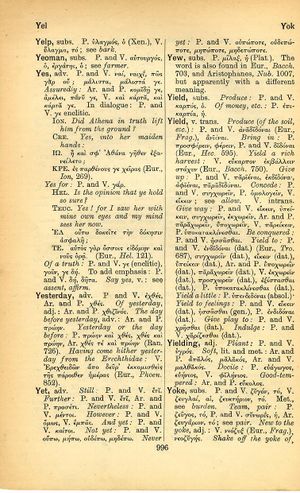yesterday: Difference between revisions
From LSJ
Οὐδείς, ὃ νοεῖς μὲν, οἶδεν, ὃ δέ ποιεῖς, βλέπει → Quid cogites, scit nemo; quid facias, patet → nicht weiß man, was du denkst, doch sieht man, was du tust
(Woodhouse 5) |
(CSV5) |
||
| Line 1: | Line 1: | ||
{{ | {{Woodhouse1 | ||
| | |Text=[[File:woodhouse_996.jpg|thumb|link={{filepath:woodhouse_996.jpg}}]]'''adv.''' | ||
P. and V. [[ἐχθές]], Ar. and P. [[χθές]]. | |||
<b class="b2">Of yesterday</b>, adj.: Ar. and P. [[χθιζινός]]. | |||
<b class="b2">The day before yesterday</b>, adv.: Ar. and P. [[πρώην]]. | |||
<b class="b2">Yesterday</b> or <b class="b2">the day before</b>: P. [[πρώην]] καὶ χθές, χθὲς καὶ [[πρώην]], Ar. [[χθές]] τε καὶ [[πρώην]] (<b class="b2">Ran.</b> 726). | |||
<b class="b2">Having come hither yesterday from the Erechthidae</b>: V. Ἐρεχθειδῶν ἄπο δεῦρʼ ἐκκομισθεὶς τῆς πάροιθεν ἡμέρας (Eur., ''Phoen.'' 852). | |||
}} | }} | ||
Revision as of 10:09, 21 July 2017
English > Greek (Woodhouse)
adv.
P. and V. ἐχθές, Ar. and P. χθές.
Of yesterday, adj.: Ar. and P. χθιζινός.
The day before yesterday, adv.: Ar. and P. πρώην.
Yesterday or the day before: P. πρώην καὶ χθές, χθὲς καὶ πρώην, Ar. χθές τε καὶ πρώην (Ran. 726).
Having come hither yesterday from the Erechthidae: V. Ἐρεχθειδῶν ἄπο δεῦρʼ ἐκκομισθεὶς τῆς πάροιθεν ἡμέρας (Eur., Phoen. 852).

